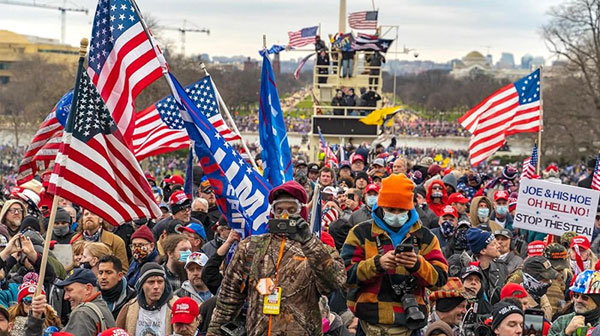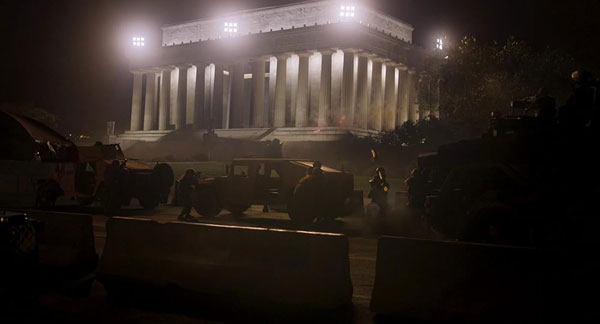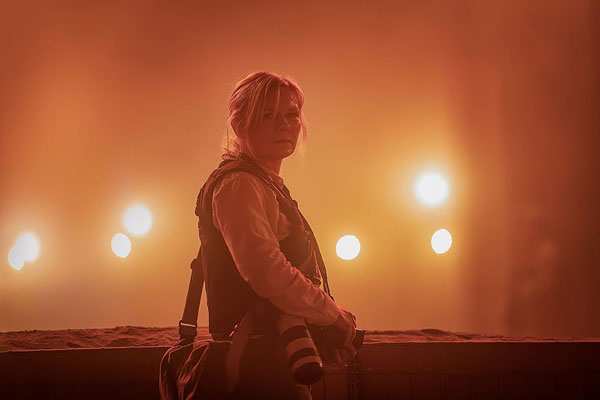|
Daniel
Hodges, an officer of the
Washington, D.C.,
Metropolitan Police, is
clearly agonized to watch
footage of rioters on Jan.
6, 2021, trying to crush
him to death with his own
shield on the steps of the
U.S. Capitol. He is
not only agonized to watch
the replay of his
suffering, but embarrassed
that this crowd of
berserkers got the drop on
him. Nevertheless,
Hodges believes the
footage needs to be seen
by as many people as
possible.
“It’s
important to get the truth
out,” he says.
This is the beginning of Andrea Nix Fine and Sean Fine’s The Sixth, the
best concise documentary
so far about what happened
on that date, when
Congress was scheduled to
confirm the results of the
2020 presidential
election. The Fines
interview six people who
were at the Capitol that
day: Hodges; his fellow
Metropolitan Police
officer Christina Laury;
their chief, now-retired
Robert J. Contee III; Mel
D. Cole, a photographer
covering the MAGA
movement; Erica Loewe, a
former Congressional
staffer; and Rep. Jamie
Raskin, D-Md.
The Sixth mixes
some of the most horrific
footage from the Capitol
riots with the
reminiscences of the six
interviewees. In
every case, the horror and
disbelief of the
interviewees remains fresh
after more than three
years. For Contee,
it was a trial by fire: he
had been police chief only
four days, and the
Metropolitan Police had
rarely been called before
Jan. 6 to aid the Capitol
Police. It was even
worse for Raskin: on Jan.
5, he had buried his son,
a suicide.
Everyone testifies to how
blindsided they were by
the insurrection.
(Sidebar: two others who
were blindsided were the
Fines, who had sent a
camera crew to record
footage for a projected
documentary about the
peaceful transfer of
power.) Christina
Laury was sprayed in the
face with bear mace.
Erica Loewe, who had
begun the day in a mood of
excited optimism for the
future, would spend it in
terror, barricaded in an
office with dozens of
others as the mob chanted
for their blood.
(She resigned soon
after.) Mel D. Cole
spoke to a polite
middle-aged woman from the
heartland who announced
proudly that she would die
that day for her children,
her grandchildren, and her
country.

“The strength of democracy is that it cares for the people,” Raskin says at one
point in The Sixth. “The weakness of democracy is that it has so many enemies.” I
would add is that the irony of Jan. 6, 2021 is that the rioters believed they were
the true friends of democracy—because Donald Trump told them they were. So
did the 147 members of Congress who refused to certify the electoral victory of
Joseph Biden, who refused to approve medals to honor the courage of the police
officers placed in harm’s way on Jan. 6, who refused even to shake the hands of
those officers. If you think that I am myself expressing rage, you’re right.
Alex Garland’s Civil War is a warning against such rage, however justified it may
seem. Photojournalist Lee Smith (Kirsten Dunst), the film’s protagonist, says at
one point that every time she films a war zone, she regards it as a warning not to
go to war. She adds, however, that it’s not her job to editorialize.
“Once you start asking yourself those questions, you can’t stop,” she says. “So we
don’t ask. We record so other people ask.”
Civil War begins with a speech by the President (Nick Offerman), who appears
only briefly in the film and remains a nameless, pompous cipher.
“Citizens of America,” the President intones, “the people of the Florida Alliance
and the Western forces of Texas and California will be welcome back to these
United States as soon as their illegal secessionist government is deposed.”

The action switches to a bloody riot in New York that ends in a suicide bombing.
Lee and her colleague Joel (Wagner Moura) barely survive, and Lee pulls Jessie
(Cailee Spaeny), an aspiring photojournalist, to safety.
The threesome adjourns to a hotel bar where Sammy (Stephen McKinley
Henderson), a veteran reporter for “what’s left of The New York Times,” joins
them. Sammy assumes Lee and Joel are heading for Charlottesville to become
embedded with the Western Forces camped there, and is thunderstruck to hear
that instead they plan to go straight to Washington to interview the President.
“They shoot journalists on sight in the capital!” he says. “Every instinct in me says
this is death.”
Sammy decides he should go along to help Lee and Joel stay safe, and Joel allows
Jessie to tag along, over Lee and Sammy’s objections. What follows is a trip
through Hell. The quartet cannot travel straight to Washington from New York;
Philadelphia, Sammy points out, is an armed camp. They must take a circuitous
route through rural Pennsylvania and the Appalachians. The society has broken
down so much that gas stations will accept only Canadian currency. Those same
gas stations, as likely as not, will have bloodied prisoners hanging from chains.
Occasionally the journalists will find respite in refugee camps, where the people
only want the fighting to end. But just as often they encounter people like the
ultra-nationalist guerilla played by Jesse Plemons in an unbilled role. Plemons is
terrifying in a scene that, for sheer horrific suspense, plays like The Zone of
Interest multiplied by Alien.
In Civil War, society has broken down into one precept: Kill or be killed. At one
point Joel asks two soldiers who are firing at a sniper if they know what side the
sniper is fighting for. “Someone’s trying to kill us,” one of them answers. “We’re
trying to kill them.” When Joel presses the point, the soldier says, “Oh, I get it.
You’re retarded.”
Civil War has been condemned in some quarters for ignoring current political
divisions in its story, but I think Garland was right. Creating a nightmare scenario
for a bloody Trump-vs.-Harris conflagration would have dated and diminished the
film. Garland is more interested in civil war itself—in the irrational partisan
hatreds that allow the haters to perceive wholesale slaughter as patriotic virtue.
Above all, he is interested in the role journalists play in reporting such
horrors—what their responsibilities are, and what daily witness to atrocities costs
them. The quartet of lead actors is magnificent in portraying that
damage—especially Dunst, who gives an unforgettable portrayal of world-weary
courage.

Like Adam McKay in Don’t Look Up, Garland doesn’t deal with any specifics of
current politics. But, also like McKay, he makes it plain which president he’s
thinking of. There may be presidents in the future who want to bomb American
civilians and abolish the FBI, but there has only been one to date.
The Democratic National Convention is scheduled for later this month in Chicago,
and some pundits are predicting violence matching or even exceeding the riots at
the last Chicago Democratic convention, in 1968. The rioters of 2024 will be very
different from those of 1968, and have very different issues. But as Garland shows
us in Civil War, hatred is always with us, and violence perpetuates it. The final
picture under the closing credits, which the rebel soldiers would take as a scene of
victory, makes that tragic point.
|